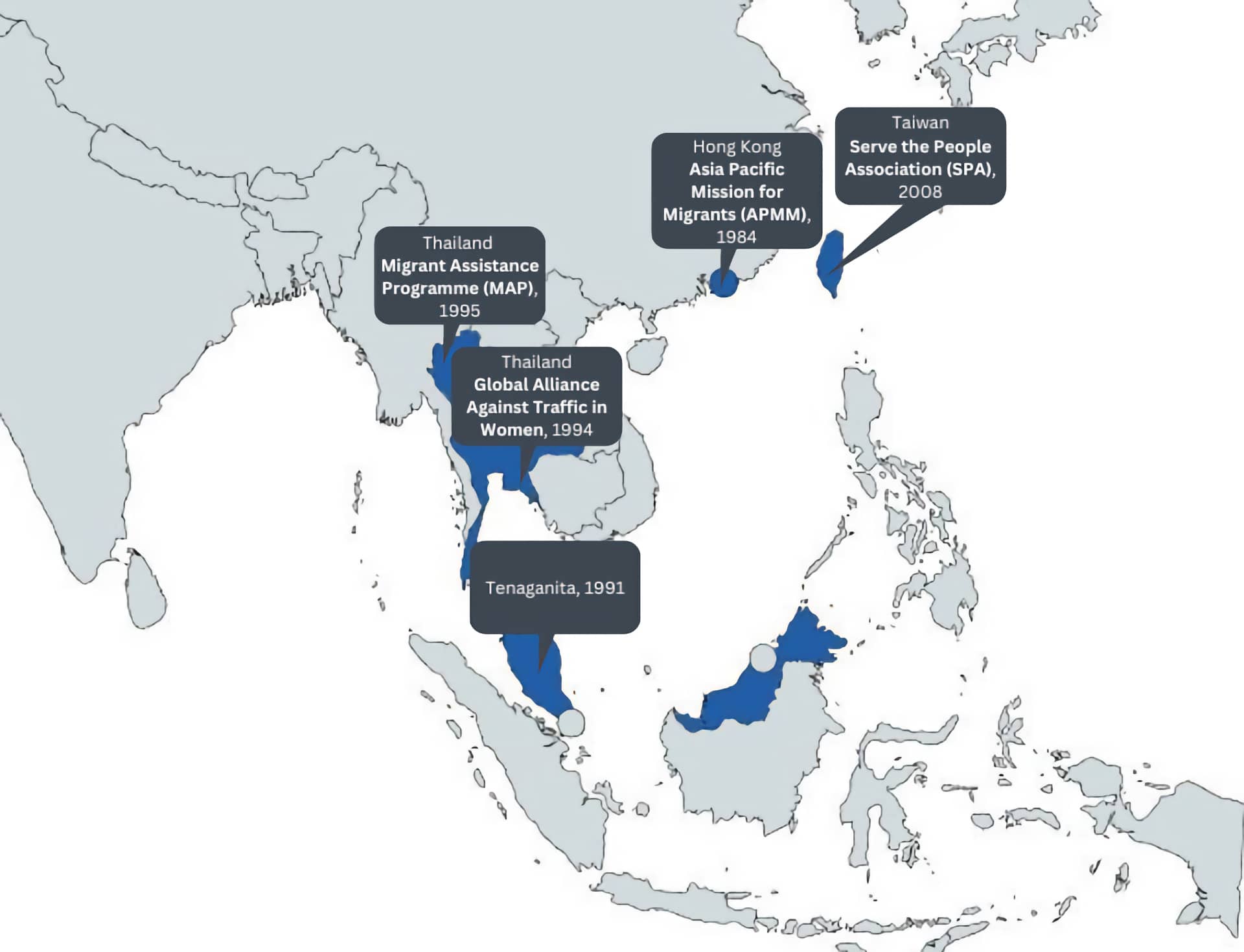Asia
Partners in South East Asia and Year of Inception

Following are the profiles of the eight organisations who are part of this learning journey along with an excerpt of their proposed project for 2023:
MAP Foundation, Thailand, established in 1996 works with the mission to empower migrant workers from Burma and their communities to take action to claim their rights and to fight discrimination against migrant workers.
With their project titled Solidarity Soap, MAP aims to build solidarity and grow its membership of migrant domestic workers through small enterprise capacity building and advocacy. They are upscaling a solution that emerged amongst this group during the initial impact of COVID. As people in this group lost their jobs and fell into debt, daily expenses became a burden. They sought to find a way to assist each other during the hard times. They exchanged information via Line (social media app) on job opportunities, and then decided they wanted to do something to reduce their cost of living. The idea came up with the need to reduce daily expenses like dishwashing detergent and clothes-washing detergent. They started making their own using basic ingredients and filling recycled bottles. They began distributing it to other members and felt that it was an enterprise they wanted to continue as part of this learning journey.
The Asia Pacific Mission for Migrants (APMM), Hong Kong, established in 1984, is a regional center committed to supporting the migrant movement through advocacy, organising, and building linkages for the advancement of migrants’ rights, with a mission to build and enhance the grassroots community movement of women migrants.
This project titled ‘Amplifying Voice of Migrants in Japan for Empowerment, Service and Action’ was conceived as APMM’s role in movement-building. The project primarily works with Filipino and other migrant workers in Japan, to ensure gender equality. During the project implementation, migrant organisations Kafin Migrant Center (KMC) and Migrante Japan will be involved and help shape the activities. This project was inspired by APMM’s experience of thriving movement-building among migrants in the last three years, by utilising new and digital technology and employing different strategies to continue the education, campaigning and organising work.
Serve the People Association (SPA), Taiwan, was founded by people concerned for workers, including labor advocates, scholars, lawyers, businessmen, workers and union officers in 2008. SPA offers free services to workers, including legal consultation, mediation of labor disputes, and assistance to unionise.
This project titled Migrant YouTubers, Migrant Podcasters is focused on deepening SPA’s understanding of recording videos, live broadcasts, and podcasts, and also different platforms that we can disseminate the programs. The managers and officers of the two unions-the National Domestic Workers Union (NDWU) and the Factory Workers Association Taiwan (FWAT) have made some live ‘know your rights’ broadcasts on Facebook with the help of SPA and they want to reach a wider audience using different social media mediums.
Tenaganita, Malaysia is a human rights organisation dedicated to assisting, building, advocating, and protecting migrants, refugees, women, and children from exploitation, abuse, discrimination, slavery, and human trafficking. We have offices and women’s shelters in the state of Selangor (Petaling Jaya) and Pulau Pinang (Penang).
This project titled ‘Support Services Program for Survivors of Human Trafficking in Selangor and Penang’ is designed for victims/survivors. They requested more structured skill programs to enable them to gain skills and training while in the shelter. Acquired skills can be applied when they go back to their communities upon their repatriation. This also includes self-care sessions for them to help ease the ongoing trauma and stress.

